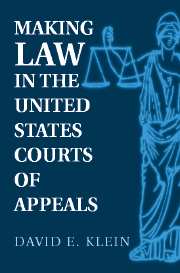Book contents
- Frontmatter
- Contents
- List of Tables
- Acknowledgments
- 1 Law Making in a Hierarchical Judicial System
- 2 Theory and Hypotheses
- 3 The Cases
- 4 Influences on Circuit Judges' Responses: Case Evidence
- 5 Influences on Circuit Judges' Responses: Interview Evidence
- 6 Anticipating the Supreme Court
- 7 Implications and Future Directions
- Appendixes
- References
- Index
2 - Theory and Hypotheses
Published online by Cambridge University Press: 10 December 2009
- Frontmatter
- Contents
- List of Tables
- Acknowledgments
- 1 Law Making in a Hierarchical Judicial System
- 2 Theory and Hypotheses
- 3 The Cases
- 4 Influences on Circuit Judges' Responses: Case Evidence
- 5 Influences on Circuit Judges' Responses: Interview Evidence
- 6 Anticipating the Supreme Court
- 7 Implications and Future Directions
- Appendixes
- References
- Index
Summary
Although judges on intermediate appellate courts enjoy considerable independence, their decisions are not made in legal or institutional vacuums. In many instances, the issues before them have been addressed previously by judges of equal authority. Even if not, there are always the precedents and possible reactions of a higher court to be considered. The aim of this study is to gain a better understanding of how and why these other judges' decisions – actual or anticipated – affect judicial resolutions of contested legal issues. Although my specific concerns are atypical, at heart this is an examination of judicial decision making. For this reason, I construct the theoretical framework for the study from the vast literature on judicial decision making in political science and legal studies.
THEORETICAL FRAMEWORK
I follow Baum (1997) by focusing on what this literature teaches us about judges' motivations, or goals. Other approaches are possible and might be preferred by some scholars. Gibson (1983) is not alone in believing that “[j]udges' decisions are a function of what they prefer to do, tempered by what they think they ought to do, but constrained by what they perceive is feasible to do” (32). Nevertheless, there is good reason to begin with an emphasis on goals. Judgeships – particularly on appellate courts – are highly prestigious, desirable, and competitive positions. Undoubtedly, most people who become judges work hard to gain the office, devoting substantial portions of their professional lives to the quest. It would be strange if the motives that brought them there were not reflected in their behavior as judges, especially in that aspect of behavior at the core of the judicial function – decision making.
- Type
- Chapter
- Information
- Making Law in the United States Courts of Appeals , pp. 10 - 39Publisher: Cambridge University PressPrint publication year: 2002



